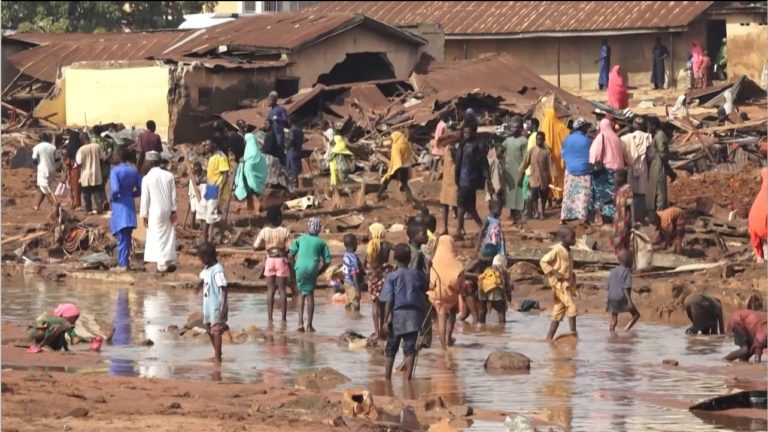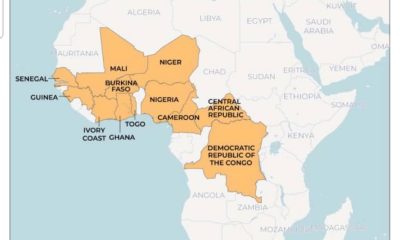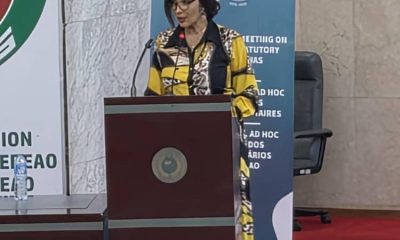SPECIAL REPORT
Climate Crisis: West Africa Demands Fairness, New Global Approach

West African nations, already dealing with the effects of climate change despite contributing minimally to global emissions, are becoming more vocal in their call for climate justice. This burgeoning movement advocates for a fundamental rethinking of global priorities, urging developed countries to accept responsibility for their historical emissions and provide meaningful assistance to vulnerable regions such as West Africa in adapting to and mitigating the climate crisis. ROLAND OGBONNAYA writes
In a world grappling with the escalating consequences of climate change, the call for justice is stronger than ever, especially in regions bearing the brunt of its devastating effects. The recent West Africa Climate Justice Roundtable in Abuja, Nigeria, provided an effective platform for environmental activists to express their concerns, share strategies, and demand accountability from the world’s largest polluters.
At the heart of their message: a stark comparison between the resources poured into warfare and the neglect shown towards addressing the climate crisis, demanding that Western developed economies invest equally in both.
Climate justice efforts in West Africa also focus on holding corporations and historical polluters accountable for their contributions to climate change and requiring them to address the damage they have caused. This includes requesting financial compensation for losses and damages, as well as stricter regulations to prevent future environmental degradation
The discussions, spearheaded by prominent figures like Nnimmo Bassey, Director of Health of Mother Earth Foundation (HOMEF), painted a grim picture of West Africa’s vulnerability and the urgent need for a unified regional front. Bassey’s impassioned plea for climate debt resonates deeply, drawing a direct parallel between the colossal sums spent on military armament and the financial reparations owed to nations disproportionately affected by a crisis they did little to create.
“That’s how much is spent, a military armament. So, to me, climate debt per year can be equated to how much money they’re spending on warfare and destruction,” Bassey asserted. His words highlight a profound disconnect in global priorities, questioning the rationale behind investing trillions in instruments of conflict while neglecting the slow-burning catastrophe of climate change.
The staggering figure of $2.7 trillion spent on warfare in 2024 serves as a stark reminder of misplaced priorities in a world that desperately needs resources diverted towards climate adaptation and mitigation.
The roundtable emphasised the numerous challenges posed by climate change in West Africa, including energy, agriculture, health, water and sanitation, security, ecosystem resilience, and migration patterns. Bassey emphasised that climate change has “extensive implications and consequences in every aspect of human existence, spanning nations and climates.”
This comprehensive viewpoint recognises that climate change is more than just an environmental issue; it is a serious threat to human security and well-being.
West Africa is especially vulnerable to climate change, with temperatures already rising above the global average. “The effects of climate change in West Africa will be significant under both the 1.5 degrees and 2.0 degrees Celsius temperature target scenarios that are being bandied about in climate policy circles around the world,” Bassey explained, emphasising the inadequacy of current global targets for a region that is already suffering the consequences.
The projected increase in hot days across the region raises concerns about future challenges, potentially exacerbating existing issues such as water scarcity, food insecurity, and desertification. These environmental stressors can cause displacement, resource conflicts, and additional socioeconomic instability.
Adding insult to injury, Bassey criticises Africa’s climate action for its ineffective policies and neocolonial approaches. He laments African policymakers’ “inability” to “take action and implement measures that effectively tackle climate change issues,” while also noting that “African leaders and policymakers have frequently allowed the continent to serve as a testing ground for unproven and controversial climate change response strategies and misleading solutions.”
This includes controversial interventions such as “smart agriculture,” GMOs, REDD+, and carbon markets, which frequently prioritise external interests over local communities’ needs. Scepticism towards these approaches stems from concerns about their potential to exacerbate inequalities, deprive communities of their land, and undermine traditional knowledge systems.
The absence of genuine consultation and participation from affected communities is a recurring theme. “The vast majority of people in West Africa who are affected by climate change have frequently been overlooked in policies and responses designed to address the crisis,” Bassey stated.
This exclusion contributes to a cycle of disempowerment, impeding the development of effective and equitable solutions. Furthermore, Bassey emphasises that: “The mechanisms for responding to climate change frequently adhere to the same neocolonial and exploitative frameworks that caused the crisis in the first place.”
In response to these challenges, the West African Climate Justice Movement is gaining traction, motivated by the belief that those most affected by climate change should play a central role in shaping solutions. Climate justice, as defined by this movement, is “ensuring that those most affected have a say in developing solutions.”
For frontline communities, this entails protecting their lands and water bodies from destructive extraction and pollution, preserving rainforests and mangroves, and opposing megaprojects and industrial agriculture that endanger livelihoods and ecosystems.
The movement also promotes transformative economies based on agroecology, community-owned renewable energy, food sovereignty, and just transitions. These approaches prioritise local knowledge, ecological sustainability, and social equity in order to build resilient and self-sufficient communities capable of adapting to the effects of climate change while lowering their carbon footprint.
The movement’s strategy centres on holding corporations and historical polluters accountable for their contributions to climate change. “Climate justice efforts in West Africa also focus on holding corporations and historical polluters accountable for their contributions to climate change and requiring them to address the damage they have caused,” Bassey emphasised. This includes requesting financial compensation for losses and damages, as well as stricter regulations to prevent future environmental degradation.
The West Africa Climate Justice Movement understands the importance of bringing together all stakeholders, from grassroots campaigners to policymakers, in a concerted effort to build popular power. The movement focusses on “developing strategies, strengthening international solidarity, sharing knowledge, and supporting collaborative climate justice initiatives based on a mutual understanding of the interconnectedness of the climate crisis and the need for unified action.”
By encouraging collaboration and knowledge sharing, the movement hopes to raise the voices of West African climate actors and strengthen their collective bargaining power.
The West Africa Climate Justice Conference in Abuja is a significant step in this direction, following previous engagements with civil society organisations, communities, academics, and movement leaders from across the region. The ultimate goal is to create a common West African Climate Change resolution that will be presented at COP 30, ensuring that the region’s distinct needs and priorities are reflected in global climate negotiations.
While the demand for equal spending on war and climate debt is a powerful symbol of the need for financial reallocation, it also serves as a call to moral reckoning. It calls on the international community to confront the historical injustices that have resulted in the climate crisis and to prioritise the well-being of vulnerable populations over short-term financial gains.
The West Africa Climate Justice Movement is not simply asking for handouts; it is demanding a fundamental shift in power dynamics, empowering affected communities to shape their own futures and hold those responsible for climate change accountable. Their call for climate justice represents a more equitable and sustainable future for all, one in which peace and environmental protection are seen as inseparable goals.
This movement’s success is dependent on West African nations’ ability to unite and amplify their voices on a global scale. The challenge is to overcome internal divisions, navigate complex political landscapes, and form alliances with like-minded actors around the world. The urgency of the climate crisis, combined with a growing awareness of the need for climate justice, provides a powerful impetus for collective action.
As the world grapples with the growing effects of climate change, the West Africa Climate Justice Movement serves as a beacon of hope, demonstrating the power of grassroots mobilisation, regional solidarity, and unwavering dedication to a more just and sustainable future. The demand for equal spending on warfare and climate debt serves as a powerful reminder that the cost of inaction far outweighs the cost of action, and that the time for transformative change has arrived.
-
CRIME4 years ago
PSC Dismisses DCP Abba Kyari, To Be Prosecuted Over Alleged $1.1m Fraud
-
FEATURED4 years ago
2022 Will Brighten Possibility Of Osinbajo Presidency, Says TPP
-
FEATURED2 years ago
Buhari’s Ministers, CEOs Should Be Held Accountable Along With Emefiele, Says Timi Frank
-
BUSINESS & ECONOMY2 years ago
Oyedemi Reigns As 2023’s Real Estate Humanitarian Of The Year
-
SPORTS2 years ago
BREAKING: Jürgen Klopp Quits Liverpool As Manager At End Of Season
-
SPORTS2 years ago
Could Liverpool Afford Kylian Mbappe For €200 million? Wages, Transfer Fee
-
ENTERTAINMENT2 years ago
Veteran Nigerian Musician, Basil Akalonu Dies At 72
-
FEATURED2 years ago
Tribunal Judgement: Peter Obi Warns Of Vanishing Electoral Jurisprudence, Heads To Supreme Court
-
BUSINESS & ECONOMY2 years ago
Oyedemi Bags ‘Next Bulls Award’ As BusinessDay Celebrates Top 25 CEOs/ Business Leaders
-
FEATURED4 years ago
2023 Presidency: South East PDP Aspirants Unite, Demand Party Ticket For Zone

































